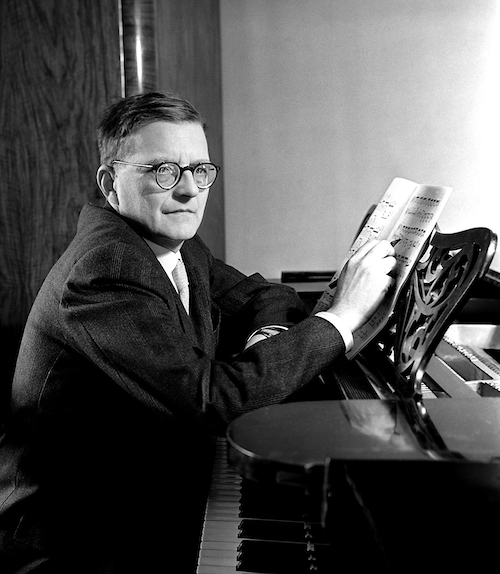New World, Cleveland Orchestra members join forces for shattering Shostakovich quartet

Dmitri Shostakovich’s String Quartet No. 9 was performed Sunday at the New World Symphony chamber concert.
In a weekend during which the collaboration between the New World Symphony and the Cleveland Orchestra reached a high point with the performance of Strauss’ Alpine Symphony, members of the Cleveland ensemble joined the academy’s fellows for a chamber music concert on Sunday afternoon.
Cleveland’s assistant concertmaster Stephen Tavani and violist Gareth Zehngut partnered violinist Jacob Buhler and cellist Shirley Kim for a thrilling performance of Shostakovich’s String Quartet No. 9 in E-flat Major at the New World Center.
Over the years, the New World’s chamber music programming has emphasized works for diverse instrumental combinations. The more conventional string quartets have been less frequently presented.
Still, in more than 35 years of attending the organization’s Sunday chamber programs, this was the finest iteration of a string quartet heard by this listener. In a performance true to the tense, brooding and moody aura of Shostakovich’s musical language, Tavani and Zehngut raised the level of music making to a standard that could rival the best professional quartets.
The Ninth Quartet is marked by Shostakovich’s typical dark angst, tempered by folk influences. The forced gaiety of the final Allegro carries its own personal message of the composer’s tortured existence under Soviet cultural domination. The players’ unified and focused approach projected the emotional despair of the first two movements. Tavani’s brilliant, fleet fiddling in the lively dance rhythms of the Allegretto infused the rapid-fire thematic fragments with vigor. The score’s contrasting dynamics were carefully attended to, befitting the work’s dual persona. In the lengthy finale, the tonal sheen of Zehngut’s viola solos registered strongly. Kim brought intense spirit and alert musicianship to the cello’s solo moments and Buhler equaled Tavani’s concetrated. edge The relentless pulsations of the music’s faux joy were powerfully emphasized with the concluding sprint to the finish fiery and exhilarating. For technical mastery and musical insight, this reading of a rarely played Shostakovich masterpiece would be hard to surpass.
Although the Shostakovich performance was the afternoon’s pinnacle, the remainder of the program proved far from marginal.
The debit side was represented by Dei Fujikura’s Cosmic Breath for wind quintet, a New World co-commission. In an introductory video, the composer said he intended to exploit the extremes of the wind instruments’ capabilities. He certainly accomplished that to ear-piercing effect. Some of the piece’s quieter moments were effective but the work’s 15-minute length felt overlong by half. Cleveland flutist Saeran St. Christopher displayed purity of tone and precision that one wished were utilized in a better score.
In the concert’s second half, University of Miami faculty member and New World alum Karen-Lord Powell was a true heroine. Powell took over violin duties from June Lee, who was unable to perform, in works by Schumann and Ned Rorem.
Schumann’s Six Studies in Canonic Form was originally written for solo pedal piano, an instrument that had a row of foot pedals like an organ. After that instrument became obsolete, Schumann’s friend Theodore Kirchner arranged the work for violin, cello and piano. It is a fascinating curio, permeated by the composer’s love of Bach but still conceived in Schumann’s own voice.
The Bachian influences are most prominent in the initial “Nicht zu schnell” which Powell played with style and exactitude, wonderfully supported by Noah Sonderling’s elegant pianism. The conversation between Powell’s violin and Marcie Kolacki’s cello in the second vignette dovetailed to winning effect. Bachi’s framing was present but more understated in the concluding Adagio. The nostalgic melody was spun in nicely melded fashion by the trio with the precision and gleam of Powell’s violin especially fine.
Ned Rorem (1923-2022) was best known for his art songs but he produced a large catalogue of instrumental music as well. His Eleven Studies for Eleven Players, written in 1959-60, stylistically ranges from Rorem’s own brand of craggy lyricism to Debussy-esque impressionism, neo-classicism and jazz. Rorem has two of the players double on flute and piccolo and oboe and English horn. The resulting eleven brief cameos are a total delight, replete with invention and distinctive bursts of melody.
Conducting fellow Molly Turner is proving to be a whiz at leading contemporary scores. With Powell as concertmaster of the chamber ensemble, Turner was thoroughly attuned to Rorem’s diverse influences. The score’s first crashing chords registered appropriate shock and the clarion sound of Kenneth Chauby’s trumpet commanded attention. The pristine clarity of Emily Bieker’s flute offered a morning “Bird Call.” Cleveland principal percussionist Marc Damoulakis and Jennifer Marasti exhibited split-second timing in “Invention for Two Percussion.” Cellist Tanya Eli, from Cleveland, brought warmth and long-spun phrasing to the neo-romantic expression of “In Memory of My Feelings.”
Turner led “Fugato,” the Rorem bouillabaisse of neo-classical and pop stylings plus a Baroque twist, with spirit and a light touch. The moody “Elegy” offered a plaintive English horn solo from Cally Banham. Cleveland clarinetist and New World alum Robert Woolfrey’s amber coloration and agility brought poignancy to the “Epilogue.” Throughout the score, Abigail Kent’s harp added texture and presence to the solo and ensemble proclamations.
The New World Symphony presents “Nosky and Uncharted Baroque” featuring conductor Molly Turner and violinist Aisslinn Nosky performing works by Johann David Heinichen, Dario Castello, Georg Philipp Telemann, Jan Dismas Zelenka, Elizabeth Jacquet de la Guerra, Michael Oesterle and Karol Szymanowski. 2 p.m. December 17 at the New World Center in Miami Beach. nws.edu
Posted in Performances
Leave a Comment
Mon Nov 20, 2023
at 1:19 pm
No Comments